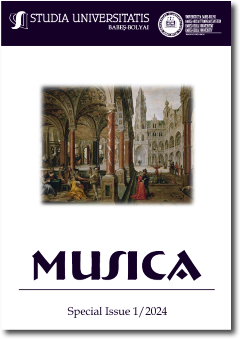Scherzo Op. 31, No. 2 by Frédéric Chopin
DOI:
https://doi.org/10.24193/subbmusica.2024.spiss1.09Keywords:
scherzo, trio, tradition, independent genreAbstract
Frédéric Chopin’s contribution to the development of the genre of scherzo is unique. The four independent Scherzos composed by Chopin represent the development and the innovation he brought to the traditional scherzo. Chopin’s Scherzos share very little of the playful character of the classic scherzo, being considered rather dramatic works. Chopin’s different approach to the genre and the names of the genres went along with the stylistic changes of the early 1830s. His approach can be described as renovating, creating a kind of internal order in the permissive world of the pianistic genres of the nineteenth century. Chopin did not choose the genre titles arbitrarily, nor used them without sense. They had thought it was not necessarily conventional, generic meaning. The composer, however, did not ignore the connotative values of the titles. More than that, he has absorbed them and built values based on these titles that he later transformed into new genres. The purpose of this article is to decipher the features of Chopin’s scherzo and his style of composition, through the analysis of Scherzo No. 2 and comparing all the scherzos composed by Chopin, which will lead to a better understanding of his musical language.
References
Chechlinska, Zofia. The Scherzo as a genre: selected problems, ‘Second International Musicological Symposium’, Warsaw, 1989.
Huneker, James. Chopin: The Man and His Music, Charles Scribner’s Sons, New York, 1900.
Jonson, G.C. Ashton. A Handbook to Chopin’s works, William Reeves, London, 1905.
Samson, Jim. The Cambridge Companion to Chopin, Cambridge University Press, 1993.
Schenker, Heinrich. Free Composition, Longman, New York, 1979.
Downloads
Published
How to Cite
Issue
Section
License
Copyright (c) 2024 Studia Universitatis Babeș-Bolyai Musica

This work is licensed under a Creative Commons Attribution-NonCommercial-NoDerivatives 4.0 International License.



